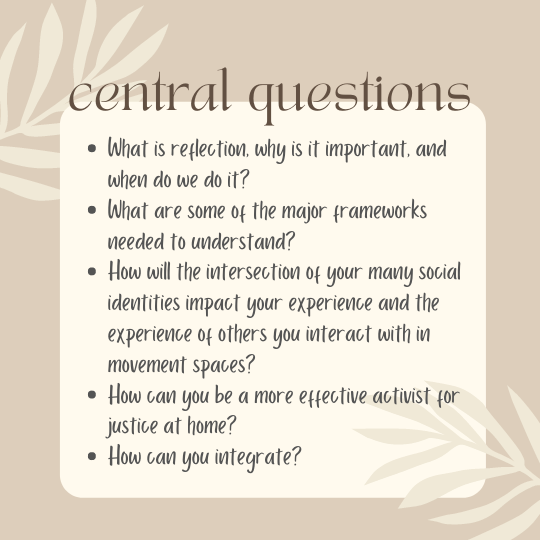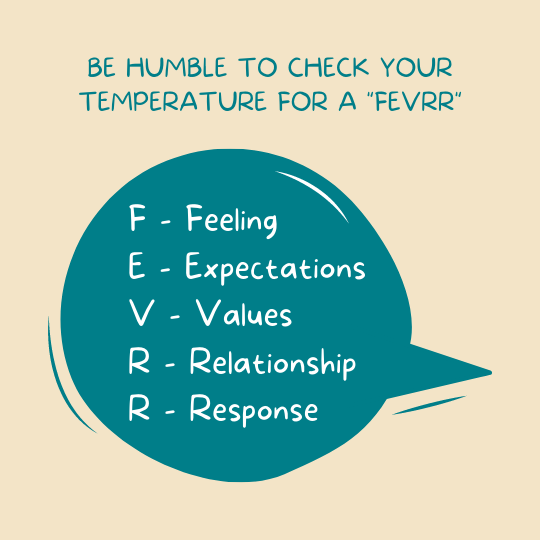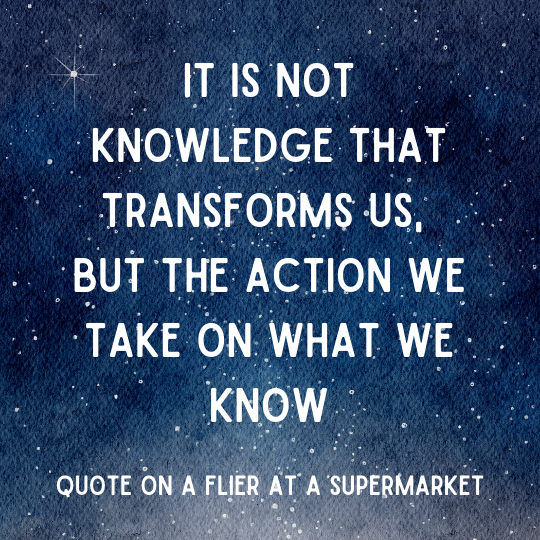WELCOME!
This Study Guide outlines the learning framework we use in all of our experiential programming. It is intended to help you better understand your values in relation to the underlying values of movements for justice, in the hope that understanding these sometimes complicated relationships will inform how you act when you show up. All experiences have the potential to become learning experiences.
Nelson Mandela is quoted to have said, “I never lose. I either win or I learn.”
With this mindset, this study guide aims to help us all become life-long, experiential learners on our quests to become effective, spiritually grounded activists for justice.
Language evolves quickly and the topics we explore in this guide are expansive and nuanced. There is no way that one resource could keep up with it all. Rather, this study guide aims to provide a framework to help you integrate learning (head) into feelings (heart) to action (hands)…and the process is not linear! This helps us act with intention and integrity.
It is as important to understand yourself as it is to understand the histories of the movements we aim to support. Our study guide helps illuminate some of the lenses we all wear, based on race, class, ability, gender, culture, place and the many other social identities that impact and define our experiences.
ON THIS PAGE:
Study Guide Framing: Five Questions
Why this Study Guide is Important
How to Use the Study Guide
The FEVRR Model
THE STUDY GUIDE IS FRAMED AROUND 5 CENTRAL QUESTIONS

Quick disclaimer: It is impossible for one guide to be comprehensive and so this guide isn’t. We hope that this guide serves as a useful tool to invite grounded reflection and help create a shared vocabulary. The tools developed through a practice of deep learning coupled with self-reflection opens us up to learning from people whose experiences may be in direct contrast to our own. It makes us better allies and activists.
WHY IS THE STUDY GUIDE IMPORTANT?
The UU College of Social Justice is committed to working with partners in the U.S. and abroad in a way that acknowledges their expertise and empowers them in their justice work. The United States (as emblematic of white settler colonial power structure) has a violent history of colonialism and imperialism, often asserting that “the American way” / white supremacy value structure…is the best way. In order to understand and integrate this legacy (and the possible connections this might have in your life and in your feelings, expectation, relationships, and actions, it is important to give yourself time for compassionate self reflection. This will allow you to bring curiosity and willingness the sometimes overwhelming experience of joining the collective fight for justice.
PLEASE GIVE THIS PROCESS THE TIME AND SPACE IT REQUIRES
HOW TO USE THE STUDY GUIDE
Information is only useful if we know how to use it. Unitarian Universalism can sometimes be very head-centered. Abstraction is a way to help us think about and understand complicated topics…and can also be a way to emotionally distance ourselves from topics we do not want to understand from a personal lens. This study guide aims at helping the readers find a way to use reflection as a tool to integrate what we learn into how we act. This process is not automatic!
We are all inherently worthy, messy, complicated, emotional people with personal histories and traumas born into global legacies of white-supremacist, heteromasculine, patriarchal, racial capitalism built upon indigenous land theft and attempted genocide…in relationship to many other inherently worthy, messy, complicated, emotional people living and nagivating this same global legacy. Sometimes how we act, or how we should act, can be confusing. Sometimes how we act does not align with who we want to be or the values we think we hold. That’s normal. It is only through ongoing, compassionate reflection can we learn to more closely align our actions with our values. The goal is not perfection. We are working towards being in right relationship with ourselves, with others (specifically targeted communities), and with the land.
WHAT DOES IT MEAN TO BE IN "RIGHT-RELATIONSHIP"? CLICK HERE.
In the words of adrienne maree brown, “Liberated relationships are one of the ways we actually create abundant justice, the understanding that there is enough attention, care, resource, and connection for all of us to access belonging, to be in our dignity, and to be safe in community”
— Pleasure Activism: The Politics of Feeling Good

The FEVRR Model
This study guide uses the FEVRR model to help guide us all through the reflection process.
Every experience can be an experiential learning experience if we take the time to reflect. But how can we remember to reflect?!
If it helps you, we’d like to offer this mnemonic: Be humble enough to take your temperature to see if you have a FEVRR: Feelings, Expectations, Values, Relationships, and Response.
Each section of our study guide will correspond to one or two of these bullet points, but if you read nothing more, remember that you can always ask yourself,
- What are my feelings right now?
- What are my spoken/unspoken expectations and how do they relate to my social identities?
- What are the values I want to guide my actions?
- What are the relationships I want to hold with myself, with others, with the land?
- In reflecting on all this, how would I like to respond in the future to similar experiences?

JUMP TO:
* Study Guide Overview *
Experiential Education & Reflection
What We Study: Expectations
How We Show Up: Values & Relationships
How We Integrate: Response

